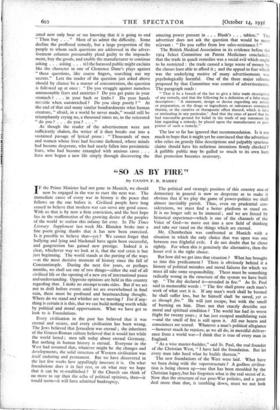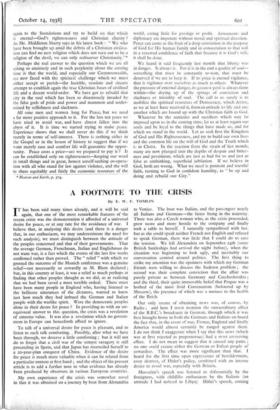SO AS BY FIRE "
By CANON F. R. BARRY
IF the Prime Minister had not gone to Munich, we should now be engaged in the war to start the next war. The immediate cause of every war in history is the peace that follows on the one before it. Civilised people have long ceased to believe that modern war can serve any good cause. With us that is by now a firm conviction, and the best hope lies in the reaffirmation of the growing desire of the peoples of the world to outlaw this infamy for ever. In The Times Literary Supplement last week Mr. Blunden broke into a fine poem giving thanks that it has now been exorcized. Is it possible to believe that—yet ? We cannot forget that bullying and lying and blackmail have again been successful, and gangsterism has gained new prestige. Indeed it is clear, whichever way we look at if, that the real crisis is but just beginning. The world stands at the parting of the ways —at the most decisive moment of history since the fall of Constantinople. During the next few years, or perhaps months, we shall see one of two things—either the end of all civilised life or the opening of a new era of international peace and understanding. Opposite opinions are held in this country regarding that. I make no attempt to take sides. But if we are not to drift before events until we are overwhelmed in final ruin, there must be profound and heartsearching thought. Where do we stand and whither are we moving ? For if any- thing is certain it is this, that we can build nothing worth while by political and moral opportunism. What we have got to look to is Foundations.
Every civilisation in the past has believed that it was eternal and secure, and every civilisation has been wrong. The Jews believed that Jerusalem was eternal ; the inheritors of the Graeco-Roman culture believed that it would last while the world lasted ; men talk today about eternal Germany. But nothing in human history is eternal. Everyone in the West had assumed that, whatever might be the changes and developments, the solid structure of Western civilisation was w. itself enduring and permanent. But we have discovered in the last few weeks how appallingly insecure it is. On what foundations does it in fact rest, or on what may we hope that it can be re-established ? If the Church can think of no more to say than the echo of political opinions, then—it would seem—it will have admitted bankruptcy. The political and strategic position of this country ana of democracy in general is now so desperate as to make it obvious that if we play the game of power-politics we shall almost inevitably perish. Thus, even on prudential con- siderations, we must find a better platform to stand on. It is no longer safe to be immoral ; and we are forced by historical experience—which is one of the channels of the Voice of God—to move out into a new field of thinking and take our stand on the things which are eternal.
Mr. Chamberlain was confronted at Munich with a situation in which the only choice that was open was one between two frightful evils. I do not doubt that he chose rightly. For when this is genuinely the alternative, then the lesser evil is the right choice.
But how did we get into that situation ? What has brought us into this predicament ? There is obviously behind it a history of political mistakes and moral failures for which we must all take some responsibility. There must be something radically wrong in the structure of the system we have built up. " The day declared it—revealed in fire." As St. Paul said in memorable words : " The fire shall prove each man's work of what sort it is. If any man's work shall be burned he shall suffer loss, but he himself shall be saved, yet so as through fire." He will just escape, but with the smell of burning on him. Does not that exactly describe our moral and spiritual condition ? The world has had its worst fright for twenty years ; it has just escaped annihilating ruin —and the smell of fire is still upon it. All our hearts and consciences are seared. Whatever a man's political allegiance —however much he rejoices, as we all do, in merciful deliver- ance from a world war—I think that is true of every man in England.
" As a wise master-builder," said St. Paul, the real founder of the Christian West, " I have laid the foundation. But let every man take heed what he builds thereon."
The new foundations of the West were laid. What have we been doing with the superstructure ? A godless civilisa- tion is being shown up—one that has been moulded by the Christian legacy, but has forgotten what is the real secret of it. Now that the structure of our post-War policies, and a great deal more than that, is tumbling down, must we not look again to the foundations and try to build on that which is eternal—God's righteousness and Christian charity ? As Mr. Middleton Murry says in his latest book : " We who have been brought up amid the debris of a Christian civilisa- tion can find no new religion which does not turn out to be a religion of the devil, we can only rediscover Christianity."* Perhaps the real answer to the question which we are all asking so anxiously and in such perplexity about the coming time is that the world, and especially our Commonwealth, are now faced with the spiritual challenge which we must either accept or perish—the humble, resolute and sincere attempt to establish again the true Christian bases of civilised life and a decent world-order. We have got to rebuild that city in the soul which has been so disastrously invaded by the false gods of pride and power and mammon and under- mined by selfishness and slackness.
All sane men and women long for Peace, but we need a far more positive approach to it. For the last ten years we have tried to avoid war, and have almost fallen into the abyss of it. It is time we started trying to make peace. Experience shows that we shall never do this if we think merely in terms of self-interest. There is nothing either in the Gospel or in the lesson of history to suggest that if we want merely ease and comfort life will guarantee the oppor- tunity. Peace costs a price—are we prepared to pay it ? It can be established only on righteousness—keeping our word in small things and in great, honest unself-seeking co-opera- tion with all who stand for law against violence, and the will to share equitably and fairly the economic resources of the * Heaven and Earth, p. 374- world, caring little for prestige or profit. Armaments and diplomacy are impotent without moral and spiritual direction. Peace can come as the fruit of a deep conviction in the purpose of God for His human family and in consecration to that will in a renewed confidence of faith that because it is God's will, it shall be done.
We heard it said frequently last month that liberty was in danger. It always is. For it is in the end a quality of soul— something that must be constantly re-won, that must be deserved if we are to keep it. If its price is eternal vigilance, that is vigilance over ourselves as much as others. Whatever the pressure of external danger, its greatest peril is always from within—the drying up of the springs of conviction and slackness or triviality of soul. The call to us surely is to mobilise the spiritual resources of Democracy, which derive, as we at least have received it, from an attitude to life and on another which are bound up with the Christian faith in God.
Whatever be the anxieties and sacrifices which may be imposed upon us in the coming time, let us at least regain our souls and be loyal to the things that have made us, and for which we stand in the world. Let us seek first the Kingdom of God and His Righteousness, and try to build our own lives and the common life on the will of God and the Truth which i; in Christ. In the reaction from the strain of last month, many are now plunged into the depths of despair and bitter- ness and pessimism, which are just as bad for us and just as false as unthinking, superficial jubilation. If we believe in God, both are wrong. What we need is penitent and trustful faith, turning to God in confident humility, to " be up and doing and rebuild our City."



















































 Previous page
Previous page